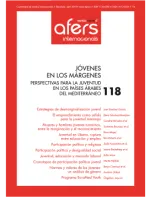Chronotopes of youth political participation in the Arab Mediterranean

This article examines the youth cultural circuits and the institutional channels of political participation in five Arab Mediterranean countries: Tunisia, Egypt, Morocco, Algeria and Lebanon. Through the triangulation of the data from the SAHWA Youth Survey 2016 (2017) and the SAHWA Ethnographic Fieldwork (2016), the experiences of political participation of the Arab Mediterranean youth in the "post-Arab Spring era" are analysed. The data – analysed with the application of the theory of chronotopes developed by the linguist Mikhail Bakhtin – show that generation gaps exist in political participation and dialogue. The "time-spaces" in which the capacities for youth agency can prosper are the streets and cafes – physical and virtual – which can also allow them to build an identity outside tradition, authority and the family (the older generations).
Keywords: political participation, youth, political institutions, street activism, virtual activism, social movement
DOI: doi.org/10.24241/rcai.2018.118.1.177
>> The full text articles of this issue are available only in Spanish Language